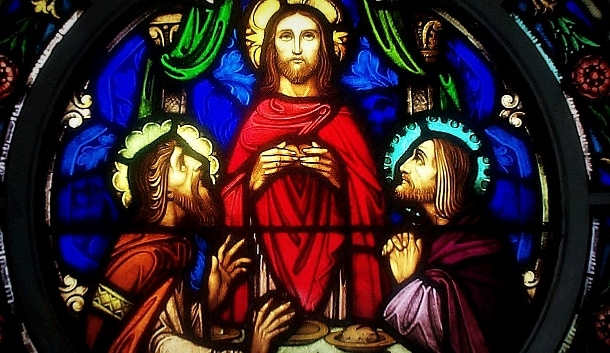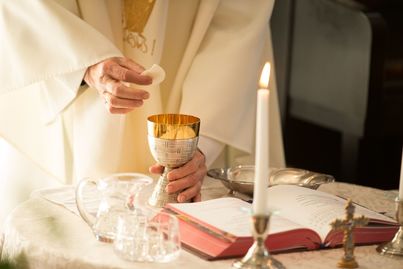the sacrament of THE EUCHARIST
The sacrament of the Eucharist (Holy Communion), the reception of Christ's true Body and Blood, is historically the third of the three Sacraments of Initiation. This sacrament is Jesus' fulfillment of his promise to be with us always. By receiving Holy Communion we are truly consuming the Body and Blood of the risen and glorified Lord Jesus.
From the Catechism of the Catholic Church:
1324 "The Eucharist is "the source and summit of the Christian life." "The other sacraments, and indeed all ecclesiastical ministries and works of the apostolate, are bound up with the Eucharist and are oriented toward it. For in the blessed Eucharist is contained the whole spiritual good of the Church, namely Christ himself, our Pasch."
1325 "The Eucharist is the efficacious sign and sublime cause of that communion in the divine life and that unity of the People of God by which the Church is kept in being. It is the culmination both of God's action sanctifying the world in Christ and of the worship men offer to Christ and through him to the Father in the Holy Spirit."
1326 Finally, by the Eucharistic celebration we already unite ourselves with the heavenly liturgy and anticipate eternal life, when God will be all in all.
1327 In brief, the Eucharist is the sum and summary of our faith: "Our way of thinking is attuned to the Eucharist, and the Eucharist in turn confirms our way of thinking."
1328 The inexhaustible richness of this sacrament is expressed in the different names we give it. Each name evokes certain aspects of it. It is called: Eucharist, because it is an action of thanksgiving to God. The Greek words eucharistein and eulogein recall the Jewish blessings that proclaim - especially during a meal - God's works: creation, redemption, and sanctification.
Only Catholics in good standing with the Church may receive the Eucharist (Orthodox Christians may as well). This is not because Catholics have some sort of exclusive club but, rather, the Eucharist is the summation of all Catholic belief. People from other religious traditions do not believe all that Catholics believe and are, therefore, not in communion with us. At Masses, non-Catholics may come forward to the priest to receive a blessing with one's arms crossed over the chest.
From the Catechism of the Catholic Church:
1324 "The Eucharist is "the source and summit of the Christian life." "The other sacraments, and indeed all ecclesiastical ministries and works of the apostolate, are bound up with the Eucharist and are oriented toward it. For in the blessed Eucharist is contained the whole spiritual good of the Church, namely Christ himself, our Pasch."
1325 "The Eucharist is the efficacious sign and sublime cause of that communion in the divine life and that unity of the People of God by which the Church is kept in being. It is the culmination both of God's action sanctifying the world in Christ and of the worship men offer to Christ and through him to the Father in the Holy Spirit."
1326 Finally, by the Eucharistic celebration we already unite ourselves with the heavenly liturgy and anticipate eternal life, when God will be all in all.
1327 In brief, the Eucharist is the sum and summary of our faith: "Our way of thinking is attuned to the Eucharist, and the Eucharist in turn confirms our way of thinking."
1328 The inexhaustible richness of this sacrament is expressed in the different names we give it. Each name evokes certain aspects of it. It is called: Eucharist, because it is an action of thanksgiving to God. The Greek words eucharistein and eulogein recall the Jewish blessings that proclaim - especially during a meal - God's works: creation, redemption, and sanctification.
Only Catholics in good standing with the Church may receive the Eucharist (Orthodox Christians may as well). This is not because Catholics have some sort of exclusive club but, rather, the Eucharist is the summation of all Catholic belief. People from other religious traditions do not believe all that Catholics believe and are, therefore, not in communion with us. At Masses, non-Catholics may come forward to the priest to receive a blessing with one's arms crossed over the chest.



